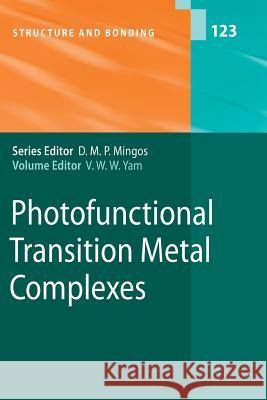Photofunctional Transition Metal Complexes » książka
Photofunctional Transition Metal Complexes
ISBN-13: 9783642071904 / Angielski / Miękka / 2010 / 259 str.
Functional materials research is one of the high priority strategic areas of - st velopmentinscienceandtechnologyinthe21 century.Amongstthevarietyof functions, theinteractionofmatterwithlighttogeneratelight-drivenorpho- responsive properties has always been one of the most appealing and attr- tive areas. Recent advances in the exploitation of transition metal complexes in bringing about photo-induced functions have attracted growing attention, particularly in areas related to materials, energy, and biomedical research. Selected examples include the development of molecular triplet emitters for organic light-emitting devices (OLEDs), optical and photo-switches, pho- chemical energy storage, dye-sensitized solar cells, photochemical molecular devices(PMD)andmachines, opticalandluminescenceprobesandchemos- sors, luminescentlabelsandtagsforbiomolecules, andluminescencesignaling and imaging. This volume serves to provide the readers with some fundamentals of - minescent transition metal complexes and the recent exciting developments of a selected variety of functions and potential applications that transition metal complexes can offer for the betterment of the society in areas related to materials, energy, and biomedical research. The ?rst chapter of this volume by Balch discussed the current progress in two-coordinate luminescent gold(I) complexes. This class of complexes is well-known to show weak metal...metal interactions that lead to the iso- tionofnovel architecturesand polymorphism fromrelatively simple building blocksandtheappearanceofuniqueelectronicabsorptionandemissionsp- troscopicfeatures.Theeffectoftheenvironment, suchassolventsandcounter ions, on the luminescence behavior of a number of two-coordinate gold(I) complexes was discussed.











